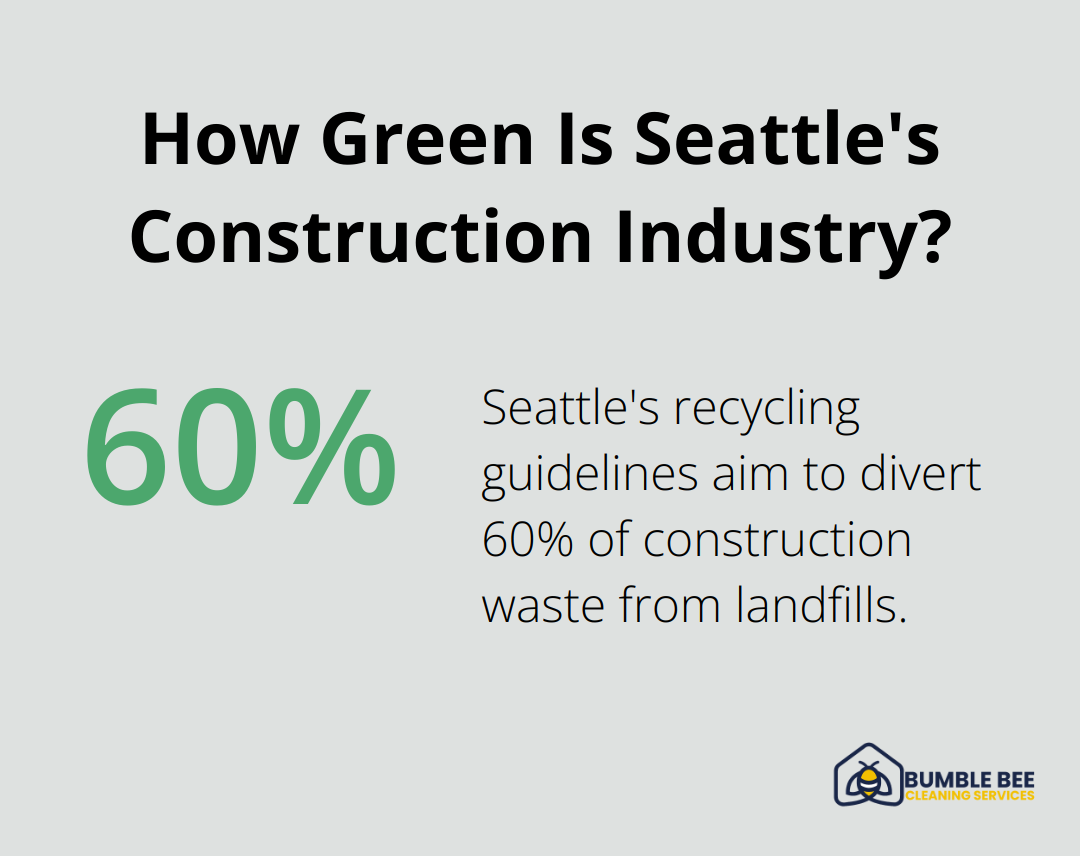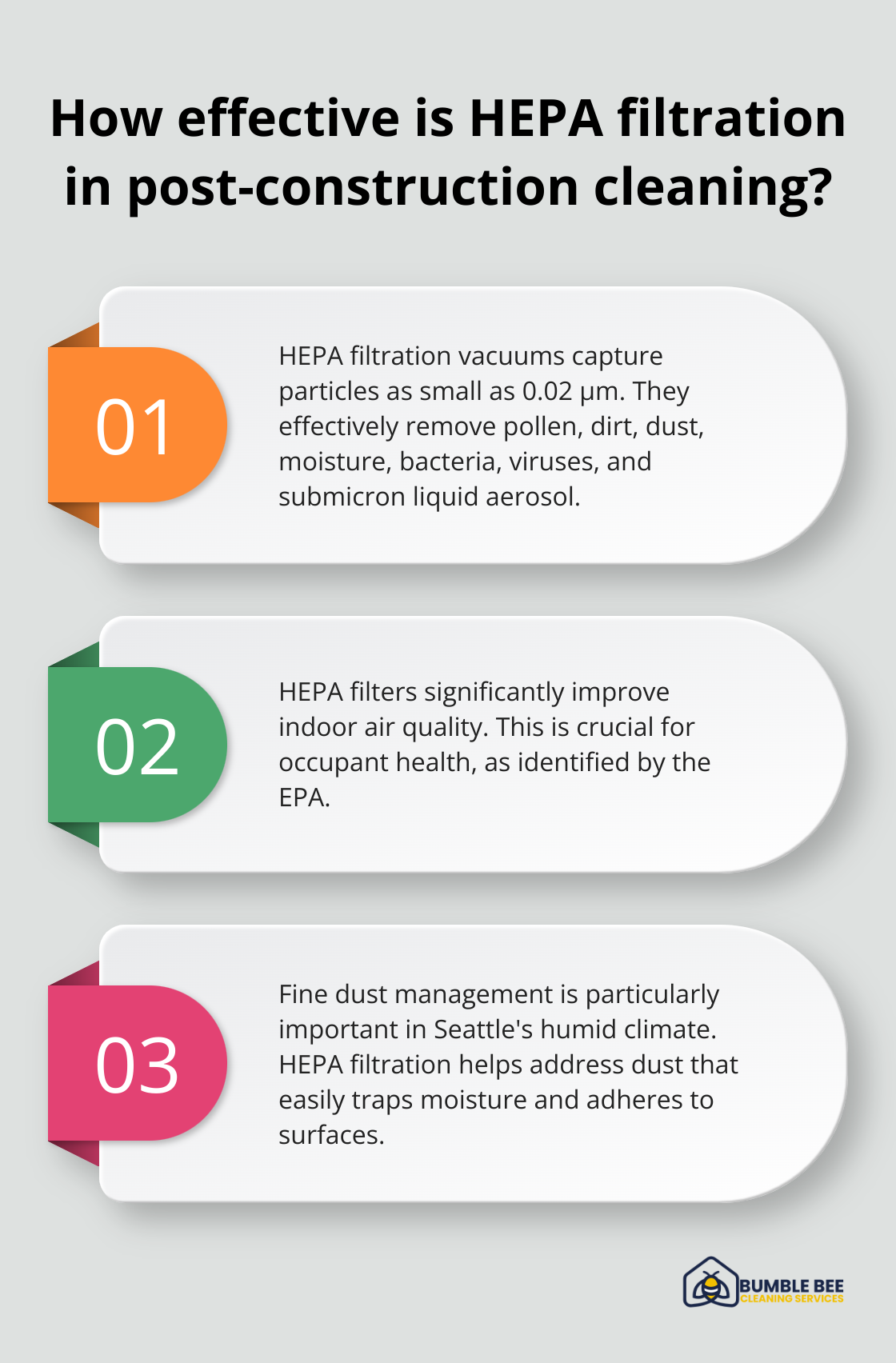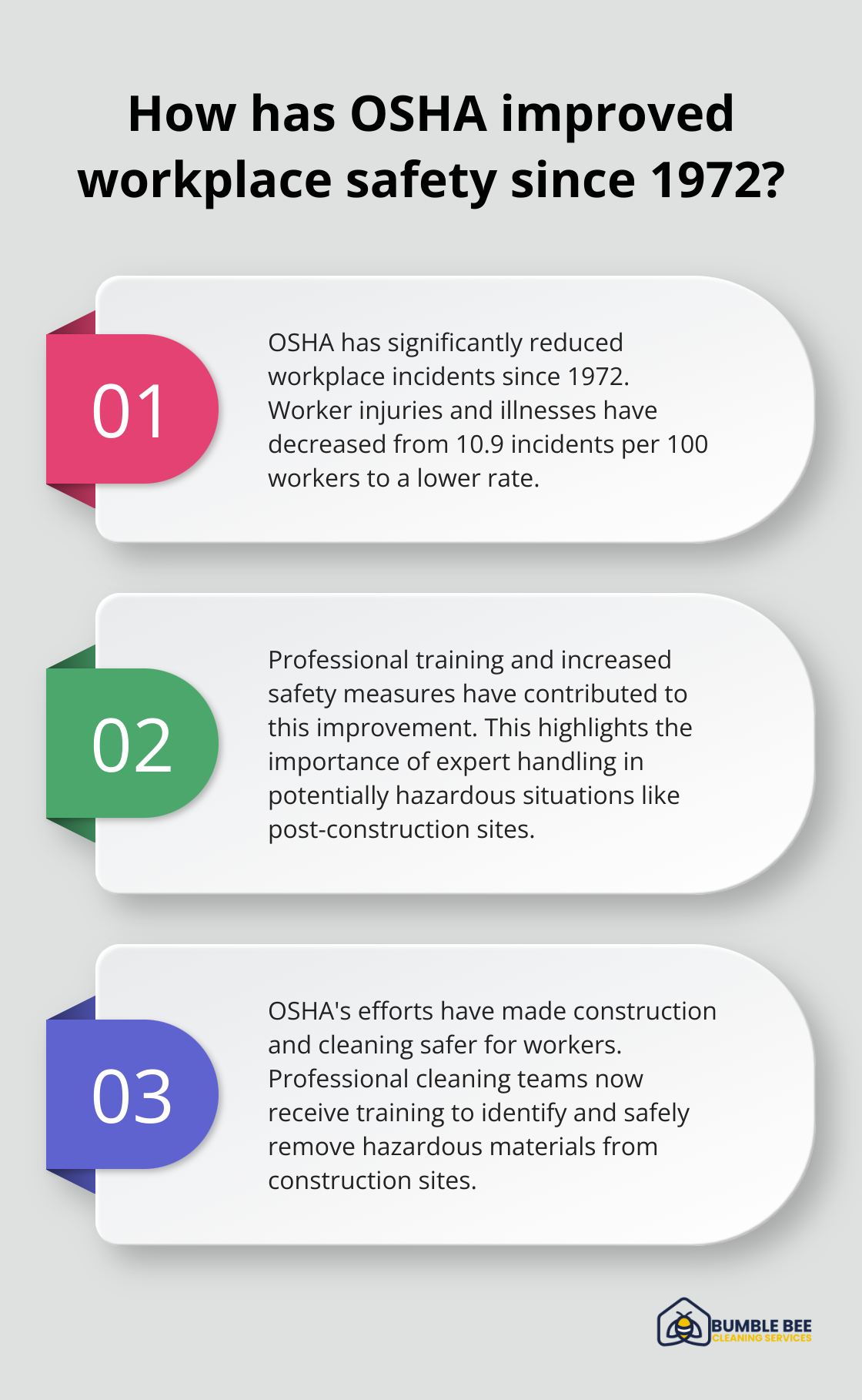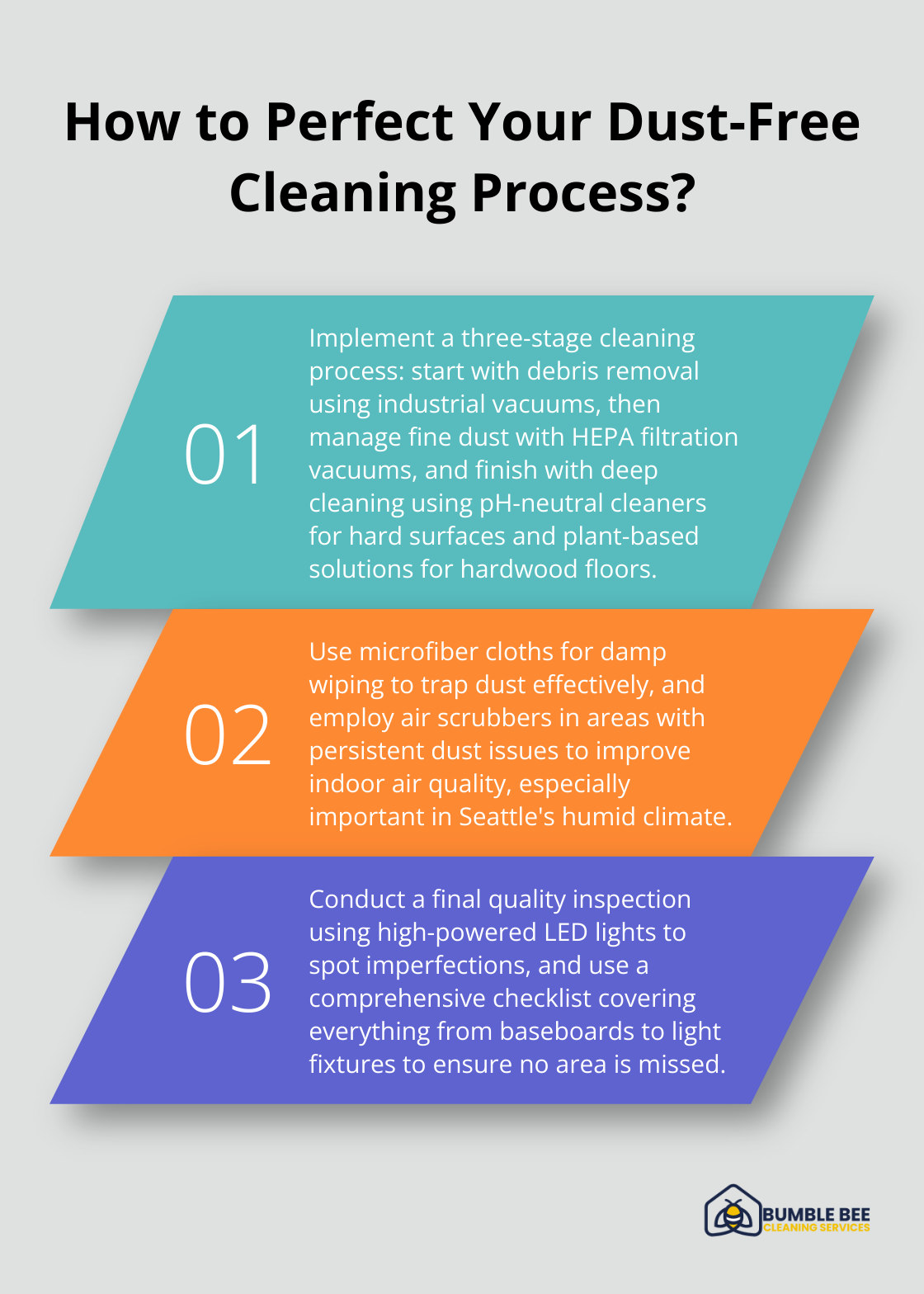Post-construction cleaning is a critical final step in any building project, ensuring a safe and pristine environment for occupants. In Seattle’s dynamic construction industry, this process comes with unique challenges due to the city’s climate and environmental regulations.
At Bumble Bee Cleaning Services, we understand the importance of thorough debris removal and fine dust management in post-construction scenarios. Our blog post will guide you through the best practices for post-construction cleaning in Seattle for 2024, helping you achieve a spotless finish for your project.
What Is Post-Construction Cleaning?
Definition and Scope
Post-construction cleaning transforms a chaotic construction site into a clean, safe, and habitable space. This process removes debris, dust, and construction residues from every surface, preparing the new or renovated area for immediate use. It’s the final step that bridges the gap between construction completion and occupancy.
Seattle’s Unique Challenges
In Seattle, post-construction cleaning faces distinct obstacles due to the city’s climate and environmental regulations. The frequent rain often results in mud being tracked through construction sites, complicating the cleaning process. Additionally, Seattle’s focus on sustainability requires cleaning methods that align with eco-friendly practices. The city’s recycling guidelines aim to divert 60% of construction waste from landfills, aligning with the goal of achieving zero waste by 2050.
The Impact of Seattle’s Weather
Seattle’s notorious rainy weather significantly affects post-construction cleaning efforts. Moisture causes dust to adhere to surfaces, making removal more challenging. It also increases the risk of mold growth, especially in newly constructed areas. To address these issues, cleaning teams must employ specialized moisture-control techniques and equipment designed for Seattle’s humid climate.
Meeting Environmental Standards
Seattle’s commitment to sustainability extends to construction and cleaning practices. The city enforces strict regulations on waste disposal and recycling, requiring post-construction cleaning teams to be knowledgeable about proper sorting and disposal methods. The use of eco-friendly cleaning solutions isn’t just a preference in Seattle; it’s often a requirement, aligning with the city’s focus on green building certifications.
Health and Safety Priorities
Post-construction cleaning plays a vital role in ensuring a safe environment for future occupants. Construction sites generate significant amounts of dust and particulate matter, which can negatively impact indoor air quality if not properly addressed. The EPA emphasizes the importance of air exchange in managing indoor pollutants, making thorough cleaning essential for health and safety.

Industrial-grade HEPA vacuums (capable of capturing 99.97% of particles as small as 0.3 microns) are a key tool in post-construction cleaning. This level of filtration significantly improves air quality, reducing the risk of respiratory issues for building occupants.
The Value of Professional Expertise
While DIY cleaning might seem tempting, professional post-construction cleaning services offer expertise that’s particularly valuable in Seattle’s unique environment. Professionals receive training in the latest cleaning techniques and safety protocols, ensuring compliance with local regulations and delivering a thorough clean that meets the high standards expected in the Seattle construction industry.
As we move forward, it’s important to understand the essential steps involved in post-construction cleaning to achieve the best results in Seattle’s challenging environment.
How to Execute Post-Construction Cleaning
Debris Removal and Rough Cleaning
The first step in post-construction cleaning involves the removal of large debris. This includes discarded materials, packaging, and leftover construction waste. In Seattle, where construction waste diversion is a priority, proper sorting of this debris is essential.

Heavy-duty equipment such as industrial vacuums and power sweepers clear floors of larger particles. For vertical surfaces, telescoping dusters reach high corners and ceilings. This initial sweep significantly reduces the amount of dust that becomes airborne in later cleaning stages.
Fine Dust Management and Air Quality Improvement
After bulk debris removal, the focus shifts to fine dust management. This step is particularly important in Seattle’s humid climate, where dust easily traps in moisture and adheres to surfaces. HEPA filtration vacuums capture pollen, dirt, dust, moisture, bacteria (0.2–2.0 μm), viruses (0.02–0.3 μm), and submicron liquid aerosol (0.02–0.5 μm). This level of filtration improves indoor air quality, which the EPA identifies as a key factor in occupant health.
For stubborn dust, damp wiping techniques prove effective. Microfiber cloths trap dust rather than spread it around. In areas with persistent dust issues, air scrubbers filter large volumes of air, removing even the finest particles.
Deep Cleaning and Sanitization
With dust under control, deep cleaning and sanitization begin. This stage involves thorough cleaning of all surfaces, from floors to fixtures. In Seattle’s damp climate, it’s important to use cleaning solutions that discourage mold growth.
Hard surfaces like countertops and tiles require pH-neutral cleaners that remove grime without damaging finishes. Windows and glass surfaces need commercial-grade solutions (which often outperform branded products). Flooring demands special attention; plant-based cleaners work well for hardwood, while vinegar solutions suit ceramic tiles.
Sanitization is vital, especially in high-touch areas. Extra attention goes to doorknobs, light switches, and other frequently touched surfaces. Kitchens and bathrooms require hospital-grade disinfectants to ensure these areas are not just clean, but hygienic.
Quality Inspection and Final Touches
The final step in the post-construction cleaning process involves a thorough quality inspection. High-powered LED lights help spot any missed areas or imperfections. This meticulous approach addresses even the smallest details.
During this phase, it’s crucial to check that all cleaning solutions have been properly rinsed away and surfaces are adequately dried. This is particularly important in Seattle’s humid environment to prevent any moisture-related issues.
A comprehensive checklist covers everything from baseboards to light fixtures. Any area that doesn’t meet high standards receives immediate attention. This commitment to quality makes professional cleaning services (like Bumble Bee Cleaning Services) a preferred choice for many Seattle construction companies.
The next chapter will explore the benefits of professional post-construction cleaning services compared to DIY approaches, helping you make an informed decision for your project.
Professional vs. DIY Post-Construction Cleaning
The Professional Advantage
Professional cleaning services offer expertise that proves invaluable in Seattle’s unique environment. These teams receive training in the latest cleaning techniques and safety protocols, which ensures compliance with local regulations. Seattle’s strict waste management rules require proper sorting and disposal of construction debris. Professional cleaners know these regulations well, which helps avoid potential fines and environmental violations.

Professional services use industrial-grade equipment that average individuals typically can’t access. HEPA filtration vacuums (capable of capturing 99.97% of particles as small as 0.3 microns) are standard tools for these teams. This level of filtration improves air quality significantly, which matters in Seattle’s damp climate where dust can easily trap moisture and lead to mold growth.
The Hidden Costs of DIY
DIY cleaning might appear cheaper at first glance, but it often results in higher long-term costs. Inexperienced cleaners may damage surfaces or use inappropriate cleaning agents, which leads to expensive repairs or replacements. For example, the use of acidic cleaners on natural stone surfaces can cause etching, which requires professional restoration.
Time is another factor that people often overlook in DIY approaches. Post-construction cleaning requires intensive labor and consumes a lot of time. A task that might take a professional team a day or two could stretch into weeks for an inexperienced individual, which delays occupancy and potentially affects project timelines.
Safety Considerations
Safety takes top priority in post-construction cleaning. Construction sites often contain hazardous materials and residues that require proper handling and disposal. Professional cleaning teams receive training to identify and safely remove these substances. They also have access to personal protective equipment (PPE) necessary for safe cleaning in potentially hazardous environments.
The Occupational Safety and Health Administration (OSHA) reports that worker injuries and illnesses have decreased from 10.9 incidents per 100 workers in 1972. This improvement results largely from increased safety measures and professional training, which highlights the importance of expert handling in potentially hazardous situations like post-construction sites.
The Long-Term Value Proposition
When you consider the cost, you must look beyond the initial price tag. Professional cleaning services offer value that extends far beyond the immediate clean-up. They help protect your investment by properly maintaining new surfaces and fixtures, which potentially extends their lifespan. Many manufacturers require professional cleaning after installation to maintain warranty validity, which adds financial importance to this service.
Furthermore, a thorough professional clean can significantly impact the marketability of a newly constructed or renovated space. A spotless, well-maintained property attracts buyers or tenants more quickly, which potentially offsets the cost of professional cleaning through faster occupancy or sale.
Final Thoughts
Post-construction cleaning in Seattle requires a comprehensive approach to address the city’s unique challenges. Debris removal, fine dust management, and eco-friendly solutions play vital roles in transforming construction sites into safe, clean spaces. Professional services offer significant advantages over DIY approaches, with expertise and industrial-grade equipment ensuring thorough cleaning while maintaining compliance with Seattle’s environmental standards.

The importance of post-construction cleaning extends beyond aesthetics to create healthy environments and protect investments. Proper cleaning extends the lifespan of new surfaces and fixtures, potentially saving money on future repairs. For those seeking professional assistance, Bumble Bee Cleaning Services offers comprehensive solutions tailored to Seattle’s needs.
We use eco-friendly products and provide flat-rate pricing with easy online booking. Our team specializes in post-construction cleaning (among other services), ensuring your newly constructed or renovated space is truly ready for occupancy. This final step bridges the gap between construction and use, setting the stage for a healthy, comfortable, and inviting environment.
